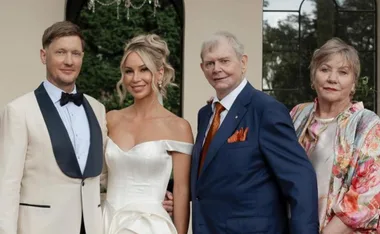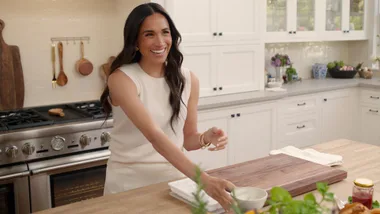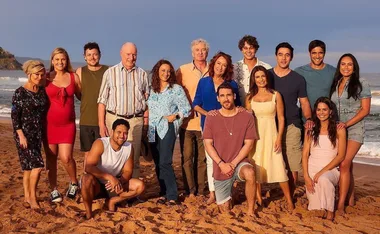AWW’s author of the month is JOANNA TROLLOPE who wrote GIRL FROM THE SOUTH, which features in the Reading Room in The Australian Women’s Weekly this month.
Q. In this novel, women in their thirties are bright, successful and independent while in search of a romantic ideal of love?
I think this is how young women see love today. They seem to be hooked on this notion of 19th century romance with a capital R and see romantic love as something that will elevate them and make them into a better person. It’s the message put out by magazines and the media. They believe that their soul mate is out there and that like a jigsaw, it’s just a matter of finding this perfect complementary piece, to be complete. It’s a search that is impractical, hopelessly idealistic. They truly seem to feel that they won’t be complete as people until they find this extraordinary perfect soul mate. In my book, Tilly tries to create Henry into such a soul mate and is doomed to terrible disappointment. Which is when Tilly goes back to basics. She goes back to her mother, finally realising, that unless she first gets that relationship right, she’s not going to get anywhere with any of the others.
Q. In contrast, Henry rather than looking for a soul mate, is unsure of what he wants and in both his work and his love life, he is unable to commit
There is the most enormous amount of choice out there and I think this makes young men bewildered. There is so much choice they are almost stupified by indecision. There is a feeling that with the girl they are going out with that it is all perfectly nice, but what if out there in the infinite world there might exist the perfect one for them. In my book, Henry feels that everything is all right with Tilly but after 10 years of living together he cannot make the commitment and ask her to marry him. Girls of Tilly’s generation, it seems to me, are almost too much for the men. They are too capable, too emotionally ambitious, and they send out confusing messages. On the one hand she says I am as independent as you are and I can earn as much, if not more, than you can, while simultaneously looking for a knight in shining armour who will take her home and make babies. Young men just duck and run.
Q. These are the children of Swinging Sixties Parents. How are the parents to blame for this confusion?
I wonder sometimes if perhaps we were careless. If the liberation and growing up in the sixties created a kind of careless freedom that spilled over when we became parents. A feeling that perhaps we didn’t concentrate enough, that the Sixties self indulgent attitudes to sex and relationships may have led to, or at least contributed to, the fragmentation of modern families. I am not certain of this, but I do wonder…
Q. Does your knowledge of today’s generation of thirtysomethings come from your own experience with your two daughters and two stepsons?
No. I firmly leave my children out of everything. It is awful enough having a parent who is well known. But I see a lot of this generation in my professional life. English publishing is full of this age group and of course I see a lot with my friends’ children who are now this age. You talk with them, read the media, and pick up on the way people are thinking and what is happening. I have been preoccupied with this age group and how they think since Bridget Jones Diary came out. Bridget Jones Diary incidentally is an excellent book and struck a real need, just as Harry Potter struck a real need. Books don’t become a huge success because they are hyped. They have to answer something the public is longing for at that time. So that’s when the idea for Girl from the South began. I kept turning it over in my mind as I noticed the anxiety so many mothers my age have about their children and I thought it was a relevant and topical to write about.
Q. Henry talks about his generation’s refusal to grow up. Do you think this true of the current 30 something generation.
I don’t know if it’s the case in Australian society. But in England, it seems to me, we have almost over-nurtured our children. In my own childhood in the 1950s you were sent out after breakfast and not be seen again until lunchtime. It was up to you to devise your own amusement. But with our own children, though we didn’t do that. We took them to music lessons, violin classes, dancing class, kung fu and whatever else. Children today are pressured to become more and more accomplished and every minute seems to be taken up and organised. From that they go to university where they are suddenly on their own and they are expected to cope. I suppose another rider to this, is the fact that these days, the family is regarded as Establishment, and therefore not cool. Teachers are also considered uncool. Which means that in times of trouble, instead of turning to parents or teachers whom they consider over the hill, young people turn to friends their own age. But however good those friends may be, at only 19 or 20 years old, their ideas are pretty half-baked. The friend maybe on their side but without any life experience, it just means the young are all at sea together.
Q. Your books are known for your distinctively English settings but this book is a breakaway, switching between London and Charleston, South Carolina. Why did you do this and why Charleston?
The only other book I have written with a setting outside of England was A Spanish Lover, part of which was set in Seville and Southern Spain. I chose Charleston for Girl From the South because I thought if the traditions of womanhood existed anywhere in the world today it would be south of the Mason-Dixon line. Southern society has strong traditions with a strong sense of support for the family. Family in the South is the old fashioned kind with aunts and uncles and cousins. In England the family has broken down badly and I wanted to contrast up to the minute modern society with its fragmented families with the old fashioned extended families of the South which are sanity savers for those grow up within them. I went to Charleston for a couple of weeks and did intense research.
Q. In Girl from the South, family is a constant theme. While Gillon at the beginning bucks under the cocoon of her family and seems to want to break away, by the end she accepts how important they are to her.
Families are important. For those lucky enough to have one, family is where we learn our life skills. Through the family we learn the skills of negotiation, appeasement, evasion and confrontation. These are skills that we carry with us into later life whether we end up running General Motors or running the country. For both men and women, family provides the grounding for human relationships. Family is where we begin and it is an area of life everybody shares from the most humble to the most elevated.
Q. Your second marriage ended in 1998. At the time you said you were depressed and felt an overwhelming sense of failure. Has this affected how you feel about marriage and would you consider marrying again?
I don’t know if I will. I would have hated not to have been married and hated even more, not to have had children. But I am finding that being on my own and being financially independent is very pleasurable. I also find I am not sorry for women on their own anymore. Actually I am really relishing this freedom and love that I don’t have to consult anyone before I decide something. All I have to do nowadays is tenderly ask myself.
Q. Girl from the South is your 11th novel under your real name and your 22nd novel if you include the books you have written under the pseudonym Caroline Harvey. Why the two names?
JT is for my novels which are contemporary, modern and realistic while Caroline Harvey is for the ones that are set in the past and more romantic. When I first started I writing I wrote historical novels. It began when I was trying to make a barrister out of my elder daughter, Louise. She had done a degree at Oxford and then decided to read for the bar and had to do a law conversion course. At that time our four children were all milling about taking degrees and Ms Harvey rather rallied to the rescue as far as Louise was concerned and paid the fees. Louise is now a barrister with two children of her own so it was worth it. The first few books I wrote under Joanna Trollope but with the success of my modern novels, I invented the name Caroline Harvey because the historical novels are a completely different genre. I haven’t written a Caroline Harvey book for about five years. There is one I would love to write but it means a great deal of research on your side of the world, just north of Australia, and I haven’t yet had time to do that. Also the ideas for the modern novel keep bubbling up, so it keeps being put back.
Q. How disciplined are you as a writer. Do you write every day?
When I am writing a book I make myself write so many words a week. That usually means writing five or six days a week very consistently and writing roughly four or five thousand words a day. I do three drafts. The first I wrote in longhand very fast on the right hand side of an A4 pad and then I tinker with that on the blank left hand side. That gets typed up and then I tinker with the typescript. The third draft is then typed up and it goes to my editor. I use longhand because while I think a computer is a useful business tool, I cannot use it for anything creative. When it comes to writing and being creative I have to use longhand.
Q. What is your advice to would-be writers?
The first thing I’d tell them is not to be ambitious too early. You make a better writer for having lived a little. You tend to write better fiction after 35. The second thing is to train your powers of observation and to this end, I often tell people to keep a journal. Not a daily dear diary, but a journal as a kind of creative scrapbook. Put into all your ideas, the things you overhear that seem telling, descriptions of things you have noticed from landscapes to facial tics. Put into the book your favourite quotations, anything that catches your eye, from photographs you love to postcard reproductions of places you’ve been. Build up a kind of file on humanity which is all part of training yourself to be this extraordinary verbal camera. Which is what writing is all about. The other thing you need is persistence. I am now 57 and was 30 when I started to write. But I was almost 40 before my first novel was published and I didn’t have any kind of success until I almost 50. My success is very recent. The Rector’s Wife was the book that gave me the turn around. That was in the summer of 1993. I was 49.
Q. You are a descendant of Anthony Trollope, the great Victorian novelist.
I always call him The Real Trollope and I related but his direct descendants are all in Australia, which is where I first met them.
Q. Where do you base yourself these days?
I am lucky, I have a town and a country life. I divide my time between a flat in London and a rented cottage in the Cotswolds just west of Oxford. I have an enormous dog, a supersized lab called Max who would loathe London. So we spend weekends together in the Cotswolds and during the week he gets cherished by some lovely neighbours.

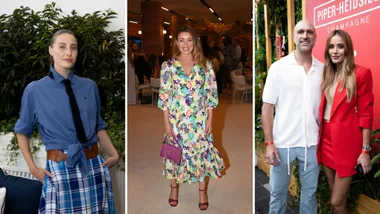

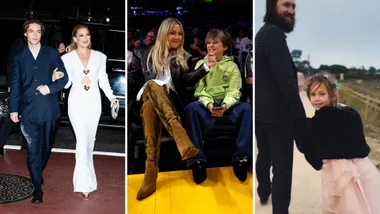
.png?resize=380%2C285)

.jpg?resize=380%2C285)
